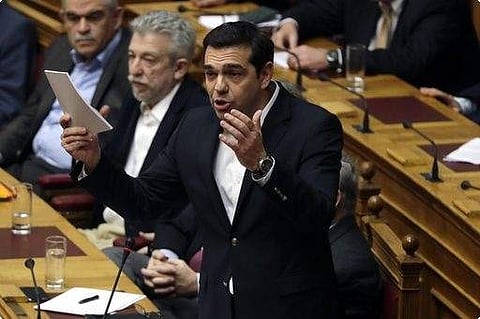

ATHENS: Greek Prime Minister Alexis Tsipras on Monday defended a controversial arms sale to Saudi Arabia which Amnesty International said should be scrapped over Riyadh's involvement in fighting in Yemen.
Tsipras said there was nothing improper in the deal, which opposition parties said was poorly handled and whose fate is currently unclear.
The PM, whose Syriza party has a strong pacifist background, was specifically asked if the deal would be abandoned. He said it was a "beneficial agreement for the Greek state."
He called the attacks "a fabrication designed to disorient public opinion," adding that the main opposition New Democracy party should "apologise" to the defence ministry.
Opposition lawmakers say the botched deal for surplus military stock cost Greece 66 million euros ($78 million), while several ruling party officials have questioned the sale of munitions to Saudi Arabia owing to its involvement in the Yemen conflict.
The defence ministry has released a document showing that it had agreed in June to sell 300,000 tank shells at a cost of 66 million euros to a Greek contractor claiming to represent Saudi Arabia.
"We reached a deal to sell outdated munitions that were going to be destroyed," Kammenos said.
"And we will try to do it again. Not to terrorists, but to countries on which we are on the same axis, such as Saudi Arabia and Egypt," he said.
But on the day the deal was signed, Greece's Riyadh embassy wired to say that the Saudi military had no knowledge of the Greek contractor's activities.
- 'Internal problems in Saudi Arabia' -
After the deal was signed, a Saudi military delegation came to Greece and tried to purchase 100,000 shells.
"There are internal problems in Saudi Arabia," Kammenos said.
Amnesty International, whose Greek branch is headed by the PM's former spokesman, noted that Greece in 2016 ratified the Arms Trade Treaty, pledging not to sell arms that could be used in violating international law.
There are fears in Greece, which has a long tradition of neutrality in the Arab world, that the missiles could have been used in Saudi Arabia's fight against rebels in Yemen.
More than 8,750 people have been killed in the conflict and the country also faces a deadly cholera epidemic and millions stand at the brink of official famine.
Tsipras' coalition government depends on the nationalist ANEL party headed by defence minister Panos Kammenos.
New Democracy leader Kyriakos Mitsotakis said the PM was being "blackmailed" by his junior coalition partner in what he described as a "scandalous sale."
The opposition has also accused Kammenos of trying to bury the issue by transferring the officer who oversaw the attempted sale.
An opposition lawmaker investigating the case has also been threatened with prosecution after submitting to parliament documents which the government says are covered by state secrecy laws.
The opposition says the government's refusal to shed light on what was supposed to be a legal bilateral deal is suspect.